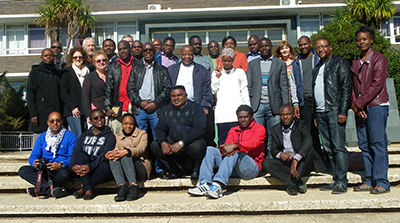Latest News Archive
Please select Category, Year, and then Month to display items
09 December 2020
|
Story Carli Kleynhans
|
Photo Supplied
 Carli Kleynhans.
Carli Kleynhans.
With the most gruelling year recorded in our entire lives, gradually coming to an end we remain hopeful and thankful that we have made it through. From the unexpected shock of going into lockdown, to the worry of having to use a blended approach to succeed in your academics and now finally settling into a new normal, we at the advising office bestow upon you the title of Kovsie champion…because that's exactly what you are!
One of our many champions, Carli Kleynhans, a 3rd (final) year student enrolled for BA Psychology and English shares how she survived…no, actually how she has thrived in 2020.
• What was your biggest concern about your academics when you found out the country was going into lockdown?
My biggest concern about my academics as a final year student was whether the online learning and tests would provide the same in depth learning experiences that are necessary to build upon for future studies.
• What are some of the challenges you've experienced along the way?
Staying focused and trying not to procrastinate was a big challenge I had to conquer, especially trying to not be distracted by my family and my phone. How I survived and was able to thrive in 2020!
• What are some of the strategies you've used to ensure your academics don’t suffer?
Time management was one of the most important strategies that I applied. For most of my classes, I was able to focus each week on a different module, by working and studying in advance I was able to keep up with my workload and still have the weekends to focus on myself, therefore creating designated time to work, study and also time to relax and read.
• What support have you received from the institution that's helped you thus far?
Most of my lecturers have provided needed support regarding our academics. The institution helped provide clarity with everything that was going on.
• What do you think the UFS could have done differently to support student success?
I think the UFS could have provided more resources for the final year students, especially considering we have to apply for further studies; online it was difficult to discern exactly what was necessary for the applications, whereas in class I feel more information would have been provided.
• What has kept you motivated?
Knowing it is my final year has helped to motivate me, as I have to use these grades to apply for further studies. I recently received recognition from Golden Key and this helped to further inspire me to work even harder at my academics.
• What advice do you have for your fellow Kovsies who are finding it difficult to keep going?
Remember to make time for yourself, to look after yourself and your mental health, especially in these difficult times. Work in advance and keep to your personal academic calendar.
First CAS Winter School brings researchers together
2016-08-01

International and University of the Free State delegates
during the three day Centre for Africa Studies
winter school.
Photo: Supplied
The first biennial doctoral Winter School by the Centre for Africa Studies at the University of the Free State (UFS) brought together UFS PhD researchers as well as current and new Africa Studies students specialising in the Conflict and Peace subfield.
According to Prof Heidi Hudson, Director of the Centre for Africa Studies, this was the aim of the Winter School, hosted in collaboration with the John and Elnora Ferguson Centre for African Studies (JEFCAS) in the Department of Peace Studies at the University of Bradford in the United Kingdom. The Winter School took place from 18-22 July 2016 on the UFS Bloemfontein Campus.
Doctoral students gain deeper insight during school
Prof Hudson said the Winter School was presented to share insights, and develop further understanding of the complex terrain of interdisciplinary studies.
“The School also provided an opportunity for the Centre’s newly-recruited doctoral students specialising in peace and conflict to gain deeper insight into Peace Studies methodologies,” said Prof Hudson.
Why male ex-combatants resort to violent behaviour?
To conclude the Winter School, Prof Donna Pankhurst from the University of Bradford presented a seminar. Her research paper, What is wrong with men? Revisiting violence against women in conflict and peacebuilding, tries to explain why men resort to violent behaviour after the end of combat duty. Prof Pankhurst described her research title as “a wacky title to grab people’s attention”. “This paper is part of a larger study which is exploring the extent to which post-traumatic stress disorder may impact on male ex-combatants' tendency to commit violence against women,” said Prof Pankhurst.